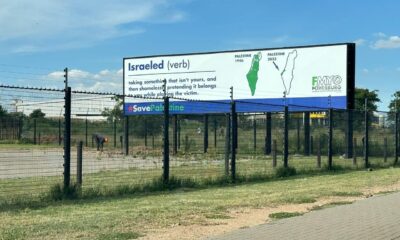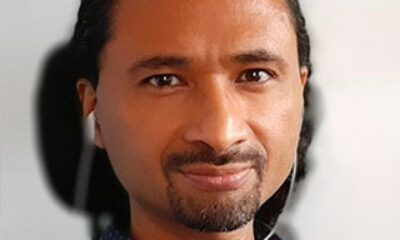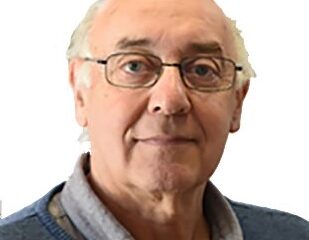
Featured Item

SA anti-Israel group tries to boycott Zoom
Africa4Palestine, formerly Boycott, Divestment, Sanctions (BDS) South Africa, has called on the international BDS movement office in Ramallah, the Boycott National Committee (BNC), to add video conferencing platform Zoom to its international boycott list.
This follows Zoom blocking a San Francisco State University (SFSU) event in which Palestinian terrorist and hijacker Leila Khaled was the main speaker. The event was streamed on YouTube and Facebook, but even this footage was later taken down by both platforms.
“The BNC guides global BDS efforts on what to boycott,” wrote Africa4Palestine in a statement. “We will await direction from BDS, and hope that it will provide guidance on the way forward before we embark on boycotting.”
However, the BNC cut ties between Africa4Palestine and its international organisation in May this year after its “mishandling and failure to properly investigate serious allegations of sexual harassment”, according to international BDS movement co-founder Omar Barghouti at the time. “This group is no longer part of the BDS movement. The BNC, which leads the BDS movement, has informed this group that it can no longer carry the BDS name,” he said in a video message.
“It seems that Africa4Palestine didn’t get the memo that BDS international doesn’t support it!” says Sara Gon, the head of strategic engagement at the Institute of Race Relations. “I don’t think this boycott would have much influence here [in South Africa] because no reputable entity is going to support a local chapter that’s no longer supported by its parent body.”
Discussing whether such a boycott could go ahead internationally, Gon says, “It’s difficult to tell whether BDS international would boycott Zoom, because two other entities [Facebook and YouTube] also refused to show Khaled. So BDS would have to boycott them too.”
Technology expert Arthur Goldstuck agrees, saying that the situation “is reminiscent of the old spy versus spy cartoons, except now it’s boycott versus boycott – but it’s hardly comical. The organisation’s use of an icon of terror underlines the destructive nature of the call to boycott, and also its likely failure.
“Even for the most human-rights-oriented tech boycotts, such as the response of many advertisers to Facebook’s inability to maintain its own community standards, the sheer size of the user base and utility of the platform means such campaigns have limited impact,” says Goldstuck. “In this case, the organisation is merely tilting at windmills, as they say. The bottom line is that Zoom is, indeed, applying community standards, and a hate-oriented boycott of this kind will work only among those committed to peddling hate.”
According to Israel Hayom, the Lawfare Project initially sent a letter to Zoom with a warning that by knowingly permitting Khaled to use its platform to communicate directly to United States college students, the online platform could violate federal law. This makes it illegal to provide material support or resources to a foreign terrorist organisation. The Lawfare Project is an American, non-profit think tank and litigation fund for the protection of human and civil rights of Jewish and pro-Israel communities worldwide.
The Lawfare Project said it had held “intensive dialogue” with Zoom regarding the event. The online platform’s deputy general counsel and chief compliance and ethics officer, Lynn Haaland, then issued a statement: “Zoom is committed to supporting the open exchange of ideas and conversations, subject to certain limitations contained in our terms of service, including those related to user compliance with applicable US export control, sanctions, and anti-terrorism laws.
“In light of the speaker’s reported affiliation or membership of a US-designated foreign terrorist organisation, and SFSU’s inability to confirm otherwise, we determined the meeting was in violation of Zoom’s terms of service, and told SFSU it may not use Zoom for this particular event,” it said.
Africa4Palestine noted that “A Women’s Day event that #Africa4Palestine held with Leila Khaled was also interrupted, on 9 August 2020”. The organisation said it was “convinced that it was a deliberate attempt by Zoom not to allow our event with Leila Khaled”.
It believes that Zoom’s actions are “part of a litany of attempts by the Zionist and pro-Israel lobby to suppress advocacy for Palestinian human rights and should be met with appropriate consequences”.
Khaled (now 76) is known for being the first woman to hijack a plane. She was part of a team that hijacked TWA flight 840 on its way from Rome to Tel Aviv in August 1969. A year later, she participated in the attempted hijacking of an El Al flight from Amsterdam to New York City as part of a series of simultaneous hijackings carried out by the Popular Front for the Liberation of Palestine (PFLP), an organisation that is blacklisted as a terrorist entity by the United States, Israel, and the European Union.
After the second hijacking, Khaled was arrested in London, where the pilot, Uri Bar-Lev, diverted the plane. Now an Israeli retiree just shy of 90, he told the Jewish News of Northern California that 50 years ago last month, he foiled Khaled and an accomplice in their hijacking attempt. “In America, if you want Leila Khaled to speak, [then] you forgot the awful pain you had in 9/11 by terror,” he said.
“On board Flight 219, according to Bar-Lev, Khaled had pulled the pins on two hand grenades. With moments to spare, he put the plane in a steep dive,” the article stated. “The aircraft plummeted 10 000 feet (3km) in less than 60 seconds. He knew his passengers, all seated and strapped in, would be safe. The terrorists were another matter – they were thrown to the floor. Khaled passed out, dropping her grenades, and they failed to go off. Once the plane levelled out, one of the two on-board Shin Bet sky marshals shot her accomplice dead. Khaled was physically subdued.”
She was arrested, but later released in exchange for hostages from another hijacking. She lives in Amman, Jordan, and remains a member of the PFLP.
Also on the panel of speakers with Khaled was South African Jewish struggle activist and former minister Ronnie Kasrils, who has long linked himself to extremist Palestinian ideology. He is also the convenor of the South African National BDS Coalition for Palestine, the new group aligned to the international BDS movement in the wake of the rupture with Africa4Palestine.
Africa4Palestine remains resolute. “When our borders are completely open and travel is unfettered, we will be sure to bring comrade Leila back to South Africa,” it wrote in its statement. “We are proud of comrade Leila as well as her political party, the Popular Front for the Liberation of Palestine, and give them our solidarity.”










